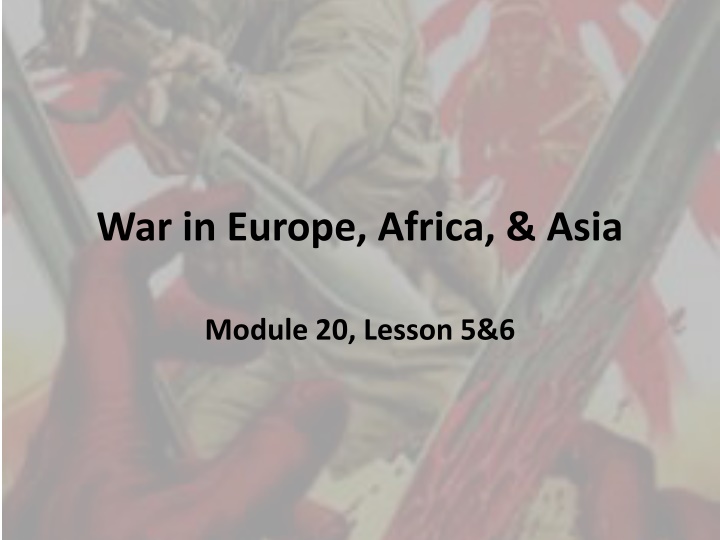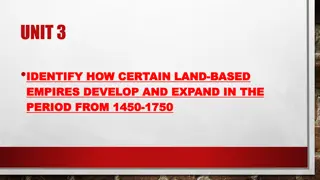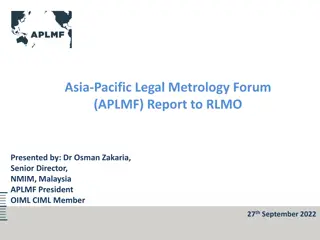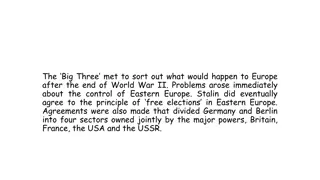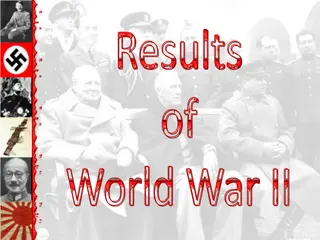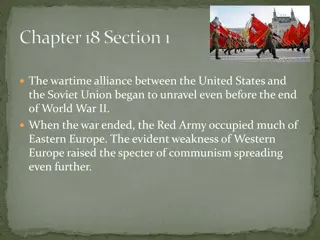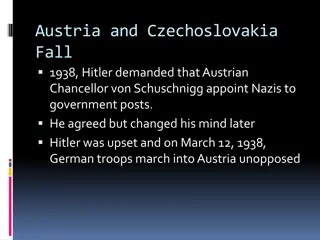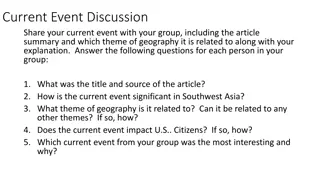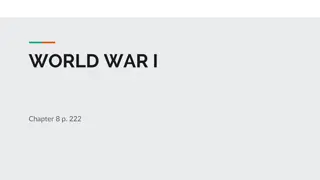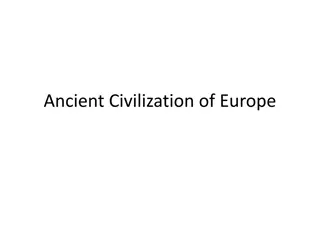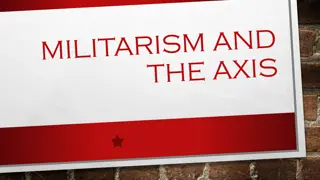World War II Campaigns in Europe, Africa, and Asia
The module discusses various campaigns during World War II in different regions such as the Atlantic, Eastern Front, North Africa, Italy, Western Front, and Pacific. It highlights significant battles like the Battle of Stalingrad in 1942, the strategic decisions made by leaders like Stalin, FDR, and Churchill, and key military operations led by figures like Dwight D. Eisenhower and the historic D-Day invasion on June 6th, 1944.
Uploaded on Sep 02, 2024 | 1 Views
Download Presentation

Please find below an Image/Link to download the presentation.
The content on the website is provided AS IS for your information and personal use only. It may not be sold, licensed, or shared on other websites without obtaining consent from the author.If you encounter any issues during the download, it is possible that the publisher has removed the file from their server.
You are allowed to download the files provided on this website for personal or commercial use, subject to the condition that they are used lawfully. All files are the property of their respective owners.
The content on the website is provided AS IS for your information and personal use only. It may not be sold, licensed, or shared on other websites without obtaining consent from the author.
E N D
Presentation Transcript
War in Europe, Africa, & Asia Module 20, Lesson 5&6
Campaigns: Atlantic: Allied convoys vs German U-boats Eastern Front: Russians vs Germans North Africa: US/Brit vs Germany/Italy Italy: US/Brits invade Italy Western Front: US/Brits vs Germans Pacific: US/Aus vs Japan
Battle of Stalingrad in 1942 The Russian winter had stopped German forces in their tracks in 1941. -In summer of 1942 German forces began going on the offensive again hoping to capture Soviet oil fields -The Luftwaffe began heavy bombing raids to pave the way for German land forces -German land forces moved in conquering the city of Stalingrad house by house however it took them too long and winter again set in
Stalin wants help Joseph Stalin asks FDR/Churchill to open a western front and start pushing toward Germany because the Soviet Union had taken enormous losses thus far FDR/Churchill instead chose to finish the Italian campaign. This will scar the relationship between the Stalin and FDR/Churchill
Stalingrad contd Russian forces surrounded Stalingrad, trapping the German forces and Hitler ordered them not to retreat -Eventually, the German forces surrender after months and months of brutal fighting and 1,100,000 soviet soldier deaths. -Now the Soviet forces would advance on Germany
Dwight D. Eisenhower Leads successful campaign in North Africa and Italy In charge of Operation Overlord (D-Day): The campaign to liberate France set in motion June 6th, 1944
D-Day: June 6th, 1944 Shortly after midnight, three divisions parachuted down behind German lines followed by early morning thousands of seaborne soldiers came in the largest land- sea-air operation in army history. Despite enormous casualties, the Allied forces were able to gain ground and eventually liberate the French capital.
Film clips: Band of Brothers: 101stAirborne (Army) parachute into France Saving Private Ryan: Marines conduct amphibious assault on the beach of Normandy
The Race is on Soviets and US/British forces would now race for the glory of being the first one to take Germany Allies capture first German town Hitler respond with a desperate final assault (8 tank divisions). After a month-long battle, German forces retreat
Meanwhile Soviet troops come across the first death camps where German SS were working feverishly to dispose of the evidence The Soviets were horrified. Americans would eventually stumble across more death camps and be equally horrified The Holocaust had been discovered
V-E Day As Allied troops were closing in, Hitler shot himself and his wife took poison. Their bodies were burned. On May 8th, 1945 the Allies celebrated V-E Day the unconditional surrender of Germany and Victory in Europe. Roosevelt died before V-E Day in 1945 and Vice President Harry Truman assumed office.
War in Japan The Allies were hoping that victory in Europe would force Japan to surrender but they would be disappointed. Allied forces, led by General Douglas MacArthur are forced to flee the Philippines leaving behind many U.S. soldiers.
Key events: Surprise air strike of Tokyo (hope) Battle of Midway (Foothold) Battle of Iwo Jima (Prepare for mainland assault) Dropping of the atomic bombs in Nagasaki & Hiroshima
The Manhattan Project This was the most enormous scientific undertaking of its time employing 600,000 Americans working in absolute secrecy Truman did not even know about the project until he became president). The project s final result was the Atomic Bomb a weapon of mass destruction.
Little Boy & Fat Man Two atomic bombs were dropped on Hiroshima and Nagasaki so much destruction ensued that Japan s emperor ordered the military to draw papers for formal surrender. I cannot bear to see my innocent people suffer any longer, he told Japan s leaders tearfully.
Yalta Conference Stalin, FDR, and Churchill met soon after Germany surrendered to discuss plans for Post- war Europe. Stalin wanted to harshly punish Germany by dividing it into militarily occupied zones to prevent them from ever attacking his people again. Churchill strongly disagreed, fearing the Stalin wanted to establish a communist regime there.
Yalta Conference contd FDR mediated between the two and Churchill conceded to Stalin because they badly wanted Stalin to take part in a new peacekeeping organization The United Nations. Compromise was reached.
Nuremberg War Trials Germany was geographically divided into three zones, occupied by American, British, and Soviet troops. In the German town of Nuremburg, German leaders and military officials were put on trial for war crimes
